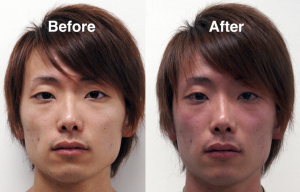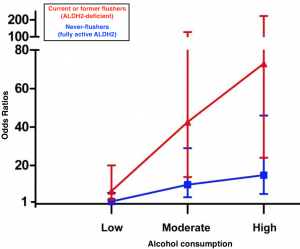It’s a commonly accepted truth that if your face is glowing red after a glass of beer, it’s because you are drunk – but this is a myth. According to research, approximately 36% of East Asians, notably Japanese, Chinese and Koreans experience a physiological phenomenon where their face and upper body start to glow red when they drink alcohol, hence, the name ‘Asian Glow’. Other symptoms can include nausea and swelling. Although the term is associated with low alcohol tolerance, it is actually a dangerous sign of accumulation of toxins in your body. Around 70% of Americans don’t realize that it can lead to DNA damage and puts those who experience it at a higher risk of esophageal cancer, one of the deadliest cancers worldwide.

Facial flushing in 22-year-old suffering from the Alcohol Flushing Response. Image via source.
What causes the glow?
The scientific term for what is more commonly known as Asian Glow is Alcohol Flush Reaction. There are two enzymes, catalysts that help with chemical reactions, involved in breaking down alcohol in our body: first, alcohol dehydrogenase (ADH), which converts alcohol into a toxic molecule called acetaldehyde and second, acetaldehyde dehydrogenase (ALDH2,) which metabolizes acetaldehyde into acetate, an easier molecule for our body to eliminate. Those who experience Asian Glow have a mutation that makes the second enzyme inactive, causing the toxic acetaldehyde to accumulate in the body. Therefore, the red glow is our body’s immune system response to high levels of this toxin.
Can’t you build up your tolerance?
People can develop a tolerance to Asian Glow by drinking on a regular basis, which in turn allows them to drink heavily. This can be a problem as not only do studies show that heavy drinking increases the risk of esophageal cancer for everyone (the blue curve in figure 1) but for people with Asian Glow, the likelihood increases significantly more (red curve in figure 1). An experiment conducted on mice with inactive ALDH2 showed an increase in DNA damage, causing bone marrow failure. Thus, DNA damage in the blood stem cells can lead to esophageal cancer.

Figure 1. Odds Ratios for Esophageal Cancer at Different Amounts of Alcohol Consumption in Relation to the Flushing Response. Modified graph by Philip Brooks et al. via the US National Library of Medicine.
Is there a cure for the Asian Glow?
Antihistamine medications, such as Pepcid AC, have been unfortunately misused to relieve Asian Glow. As these medications are used to alleviate skin redness and restricted breathing from the immune system response to the toxin, they do not get rid of the toxins itself. Therefore, taking antihistamines as an Asian Glow solution is not recommended.
Luckily, our body has a DNA repair system that can fix the damage caused by alcohol. This system is in place in order to relieve any normally produce alcohol from partially digested food in your stomach. However, this system can be overworked once large amounts of alcohol have been ingested.
In order to overcome this, you can pace your drinks and have a glass of water between each drink if you are in a situation where alcohol is unavoidable. However, knowing the health risks, it is best to avoid alcohol entirely if you suffer from Asian Glow.
Written by Suyoung Ahn



